...
The Sets tab contains a list of server sets. Each set represents a logical grouping of MQTT servers. When a set is referenced by a Transmitter configuration, a single connection to one of the servers in the set will be maintained. The other servers will act as failover in the case that a connection with the first is lost. Server sets cannot have common elements meaning that a single MQTT server cannot be in more than one set.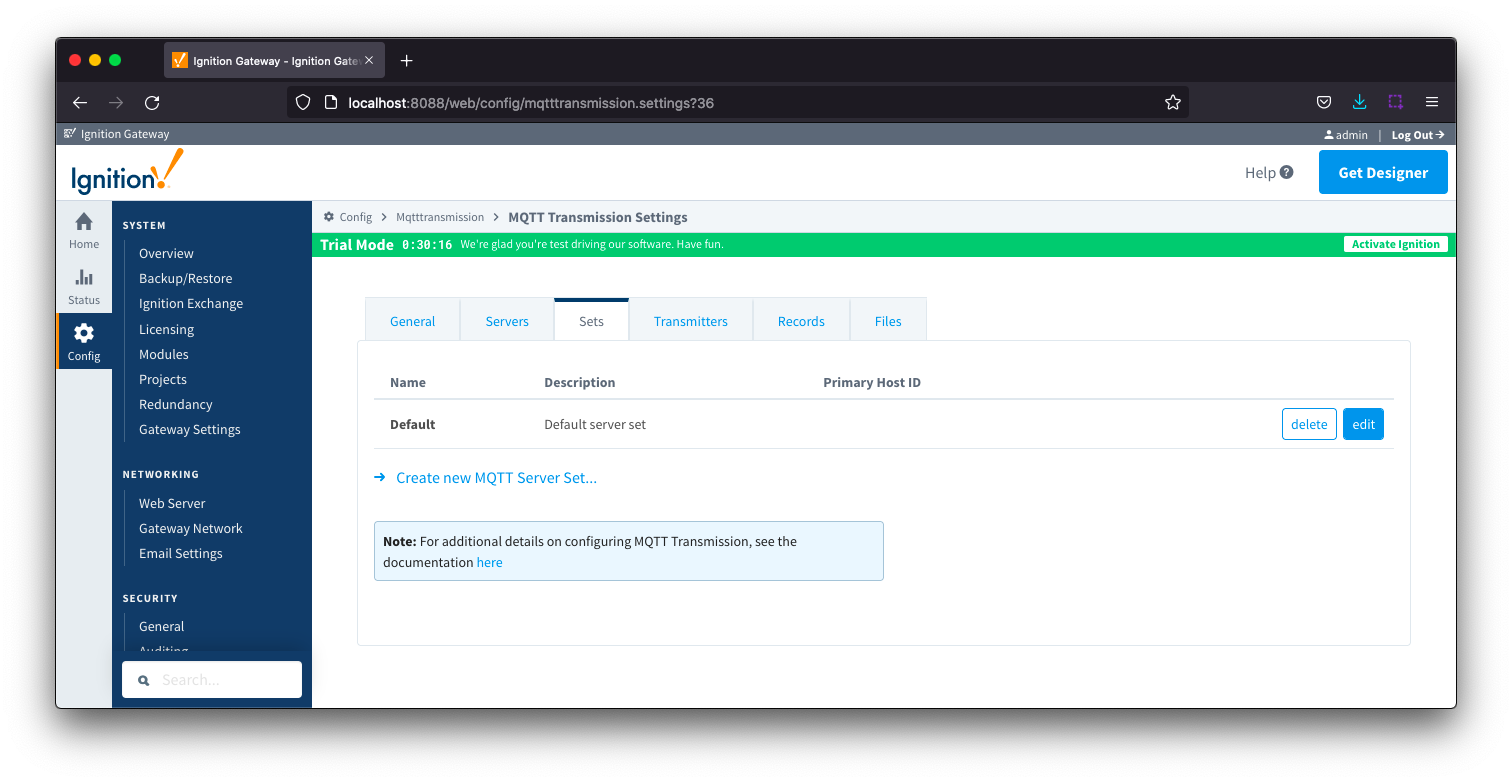 Image Added
Image Added
The Sets tab contains a single Main section.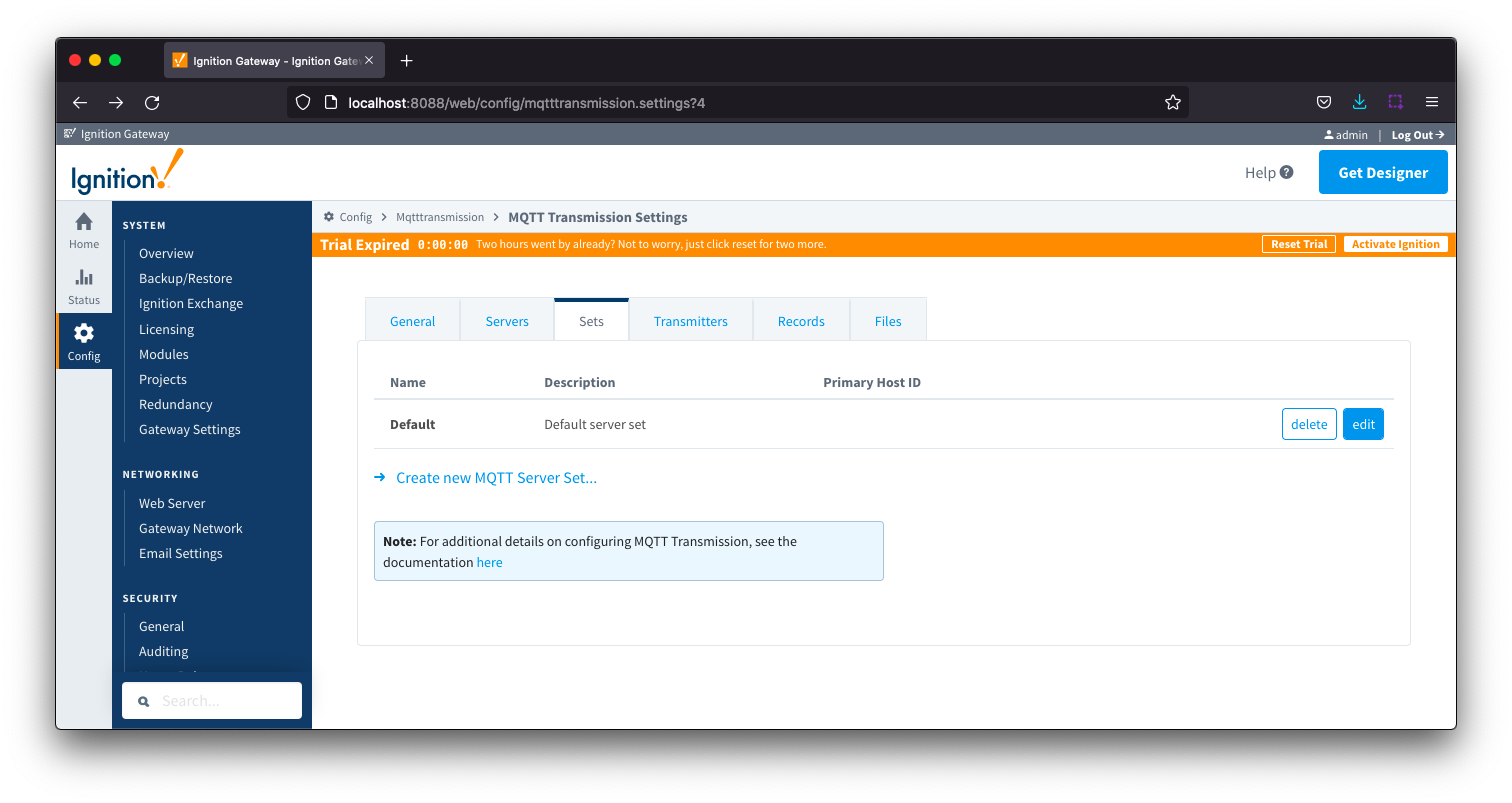 Image Removed
Image Removed
Sets - Main
...
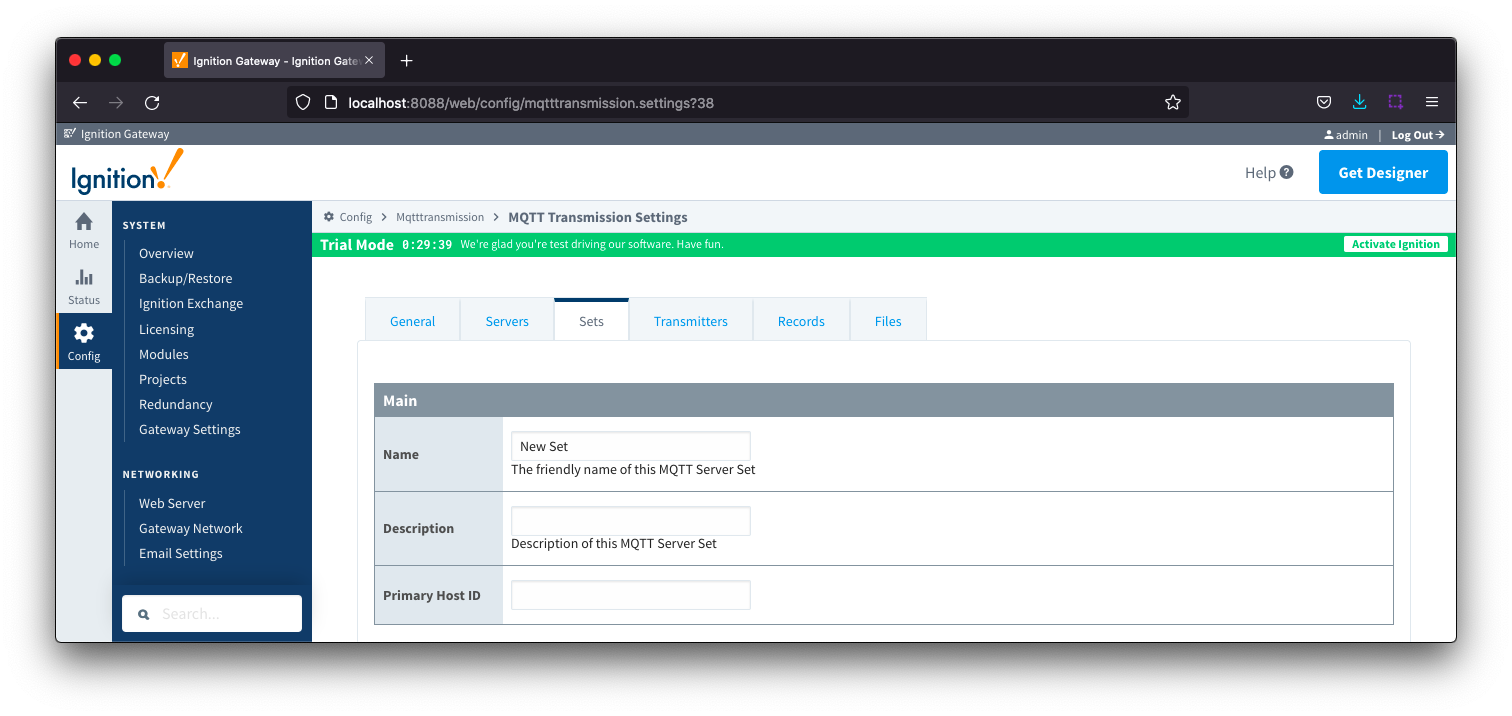 Image Added
Image Added
- Name
- This is the friendly name of the set used to easily identify it.
- Description
- This is a friendly description of the set.
- Primary Host ID
- The primary host ID to use for 'state' notifications. These notifications are used to notify MQTT Transmission if the primary backend application loses connection with the MQTT Server, meaning it has gone 'offline'. If MQTT Transmission is notified that the primary backend application has gone 'offline', it will close it's client connection with the MQTT server and walk to the next MQTT server defined in the set. If the primary host ID is not set, MQTT Transmission will not subscribe on the notification topics and not receive any 'state' notifications.
- This must contain only letters, numbers, or any of the following special characters: . $ % @ ! - _ ^ *
...
- Name
- Unique name for the Transmitter
- Enabled
- Checkbox to enable/disable the Transmitter. Selected by default.
- Tag Provider
- The name of the tag provider that Transmission will monitor. By default this is the Ignition 'default' provider.
- Tag Path
- Optional path to the root folder where the tag tree starts
- Tag Pacing Period
- The buffer period for outgoing Transmission messages in milliseconds. The default is 1000ms. This means when a tag change event is detected 1000ms will elapse before an MQTT message is sent. This allows additional tag change events to be buffered and put into the message and in turn reduce the number of generated MQTT messages.
- Set
- The Set that the default MQTT Transmission client will connect to.
- Discovery Delay
- An optional startup delay, in milliseconds, to wait before scanning for Tags to monitor. This is useful when Tags are dynamically created on initial startup, as is the case when using the MQTT Engine module.
- Aliased Tags
- Checkbox to enable/disable using aliases for tag names when published data messages as tag values change in order to optimize payload size when publishing data. Not selected by default.
- Compression
- The algorithm to use to compress payloads before they are published to the MQTT Server. If 'NONE' is selected then compression is disabled.
- Convert UDTs
- Checkbox to enable/disable converting UDT members to normal Tags before publishing. If enabled the Tags representing the UDT member will retain their member path prefixed by the UDT Instance name. Selected by default.
- Publish UDT Definitions
- Checkbox to enable/disable publishing UDT Definitions in BIRTH. Selected by default and not editable.
- Optimize UDTs
- Checkbox to enable/disable optimizing UDT payload sizes in NDATA and DDATA payloads. Selected by default and not editable.
- Enable Birth Caching
- Checkbox to enable/disable caching birth requests for faster rebirth request response. Not selected by default.
| Anchor |
|---|
| TransmittersCommandSettings |
|---|
| TransmittersCommandSettings |
|---|
|
Transmitters - Command Settings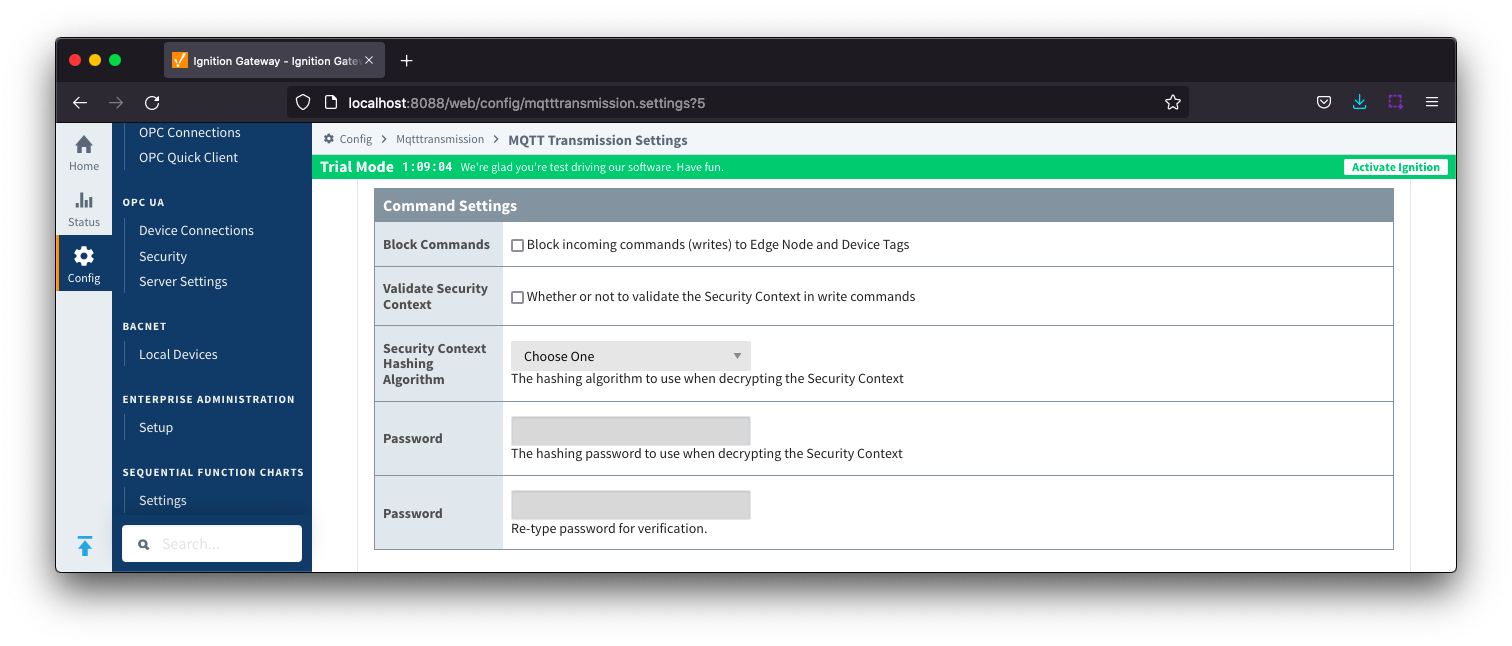 Image Modified
Image ModifiedBlock Commands
- Checkbox to enable/disable the ability to block commands and tag writes received as messages from the MQTT server. Not selected by default.
- Validate Security Context
- Checkbox to enable/disable the ability to validate the Security Context in write commands. Not selected by default.
- Security Context Hashing Algorithm
- The hashing algorithm to use when decrypting the Security Context. Available if "Validate Security Context" is enabled.
- Password
- The hashing password to use when decrypting the Security Context. Available if "Validate Security Context" is enabled.
| Anchor |
|---|
| TransmittersHistorySettings |
|---|
| TransmittersHistorySettings |
|---|
|
Transmitters - History Settings

Note: Store and Forward does not guarantee all data is stored and forwarded. There are some edge cases that are not currently handled with regard to data loss in the event of connection failures related to MQTT keep alive timeouts. This window of potential missed data can be reduced by decreasing MQTT Transmission and MQTT Engine configurable keep alive timeouts.
...
The 'Records' tab allows user to create a table of custom records. Each record defines a folder (under specified tag provider) in which user can create a number of tags that will be published as a record by clicking the 'Publish' checkbox. The 'Publish' tag will be created automatically in the folder specified.

The configuration sections available are Tag Settings, Sparkplug Settings and Sparkplug Advanced Settings.
...
| Anchor |
|---|
| RecordsTagSettings |
|---|
| RecordsTagSettings |
|---|
|
Records -
Tag Settings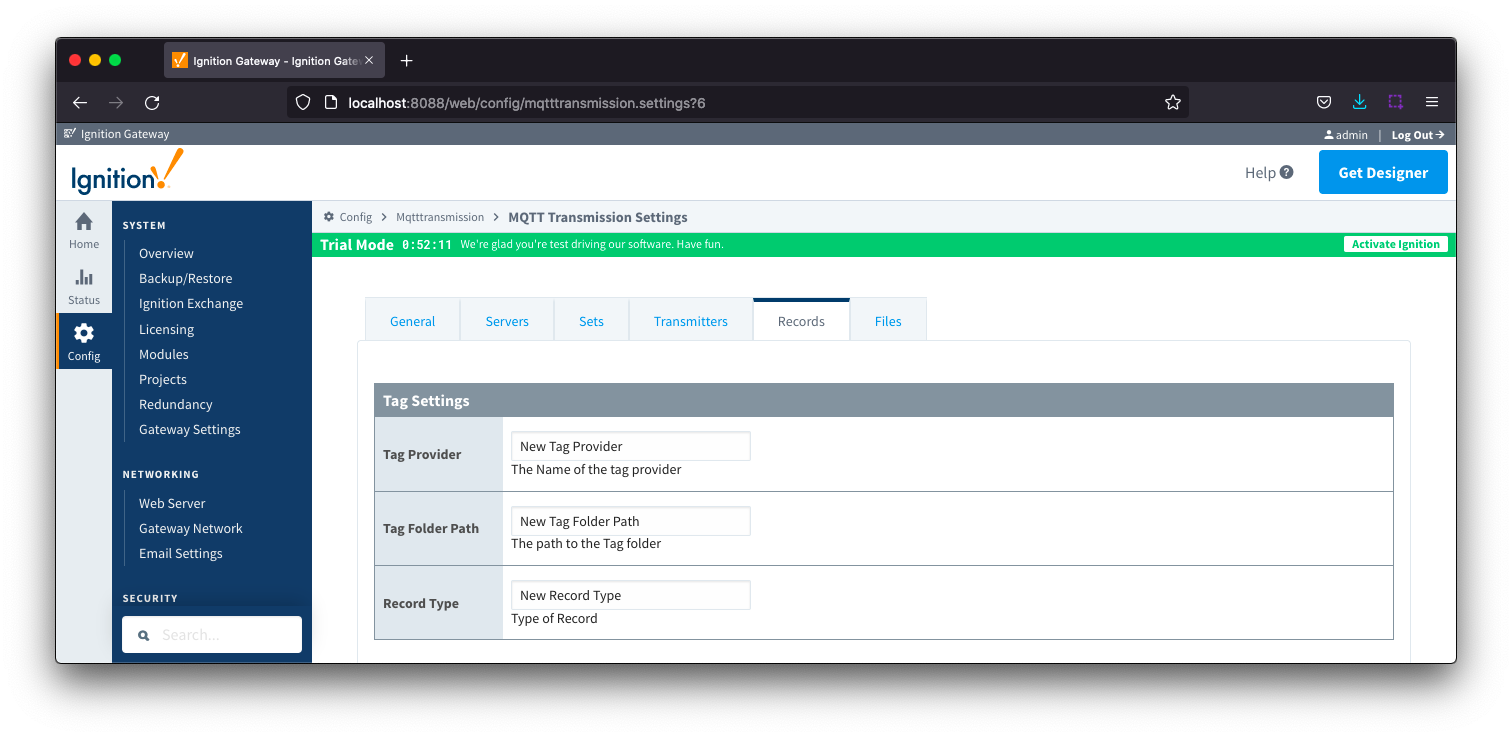 Image Added
Image Added- Tag Provider
- The name of the tag provider (i.e. default)
- Tag Folder Path
- The path to the tag folder under specified tag provider
- Record Type
| Anchor |
|---|
| RecordsSparkplugSettings |
|---|
| RecordsSparkplugSettings |
|---|
|
Records - Sparkplug Settings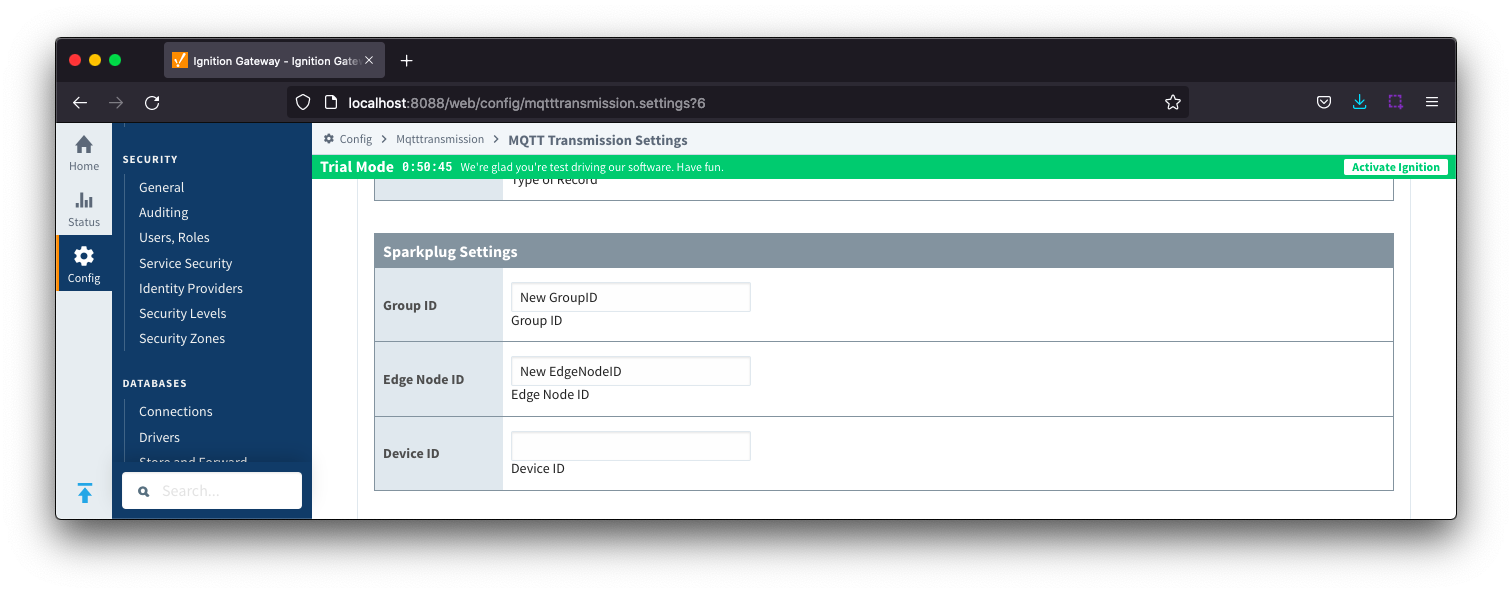 Image Added
Image Added
- Group ID
- An ID representing a logical grouping of MQTT Edge of Network (EoN) Nodes and Devices into the infrastructure.
- Edge Node ID
- An ID that uniquely identifies the MQTT Edge of Network (EoN) Node within the infrastructure.
- Device ID
- An Optional ID that uniquely identifies a Device within the infrastructure.
| Anchor |
|---|
| RecordsAdvancedSettings |
|---|
| RecordsAdvancedSettings |
|---|
|
Records - Advanced Settings Image Added
Image Added- Override Publish Tag
- Checkbox to override the default 'Publish Tag' in the Record defined folder path
- Publish Tag Path
- Overrides the default 'Publish Tag' in the Record defined folder path
Files
The 'Files' tab allows for the configuration to publish files which are transferred using Sparkplug over MQTT.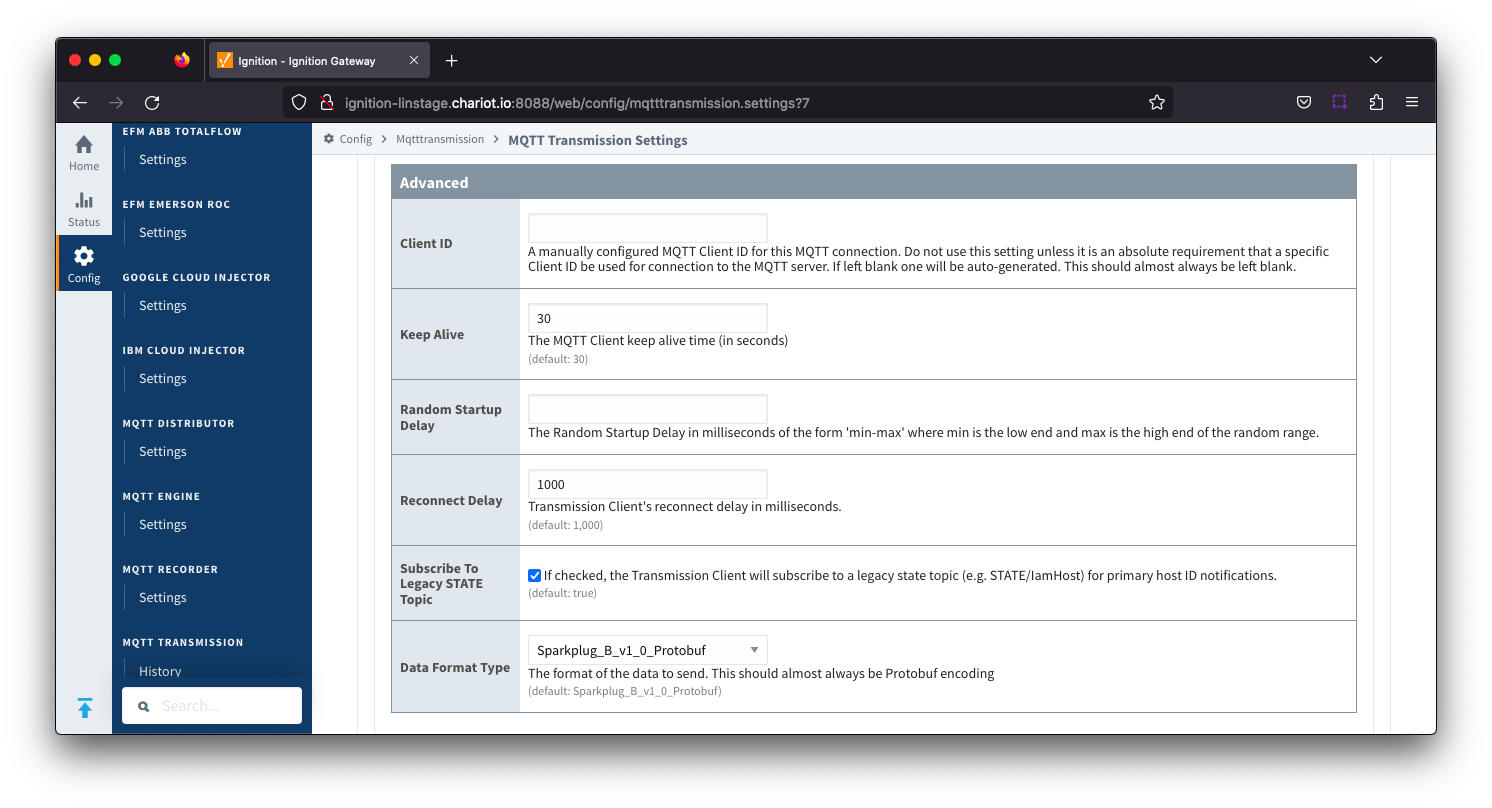
The configuration sections available are Tag Settings, File Settings, Sparkplug Settings and Advanced Settings.
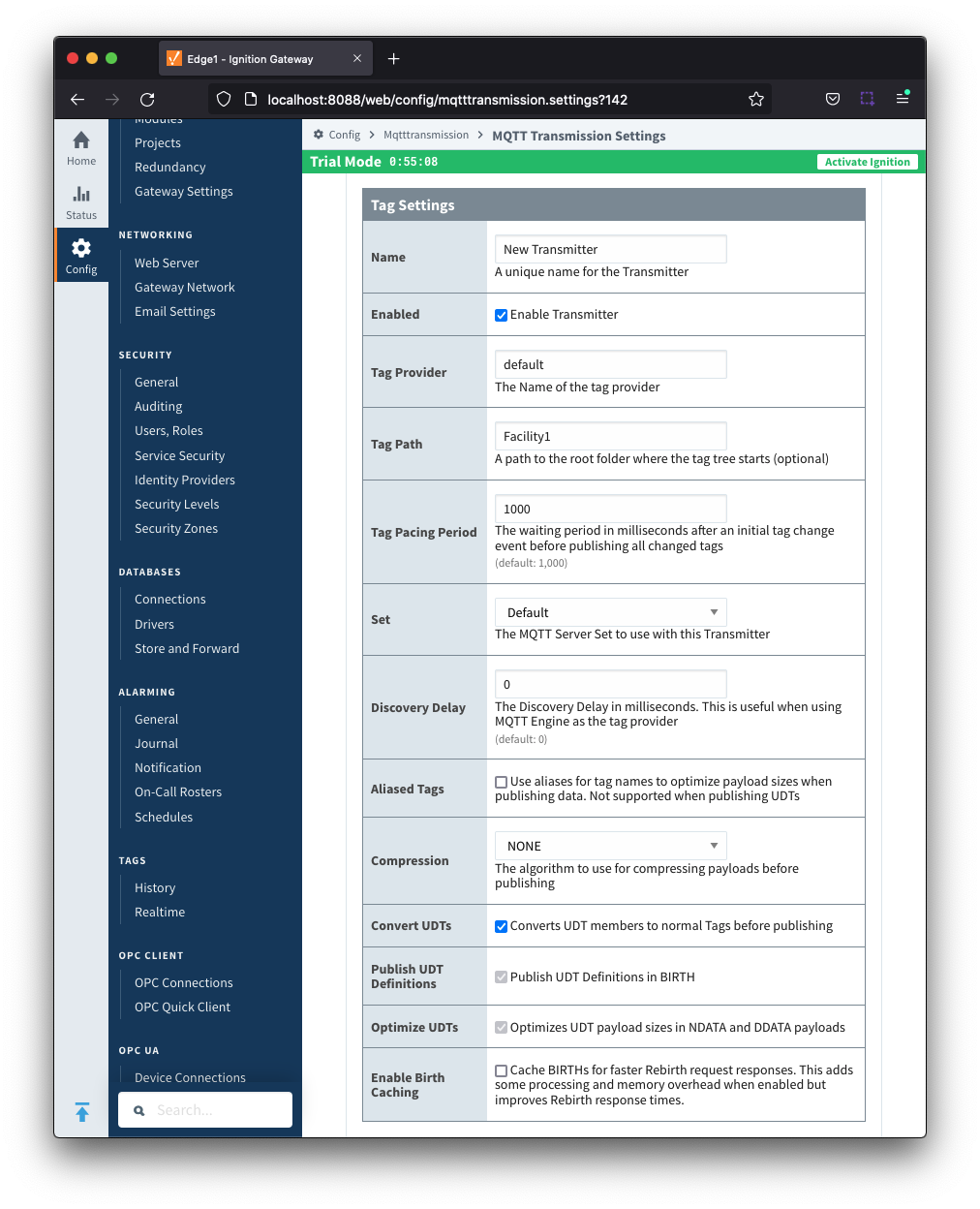 Image Removed
Image Removed
| Anchor |
|---|
| FilesTagSettings |
|---|
| FilesTagSettings |
|---|
|
Files - Tag Settings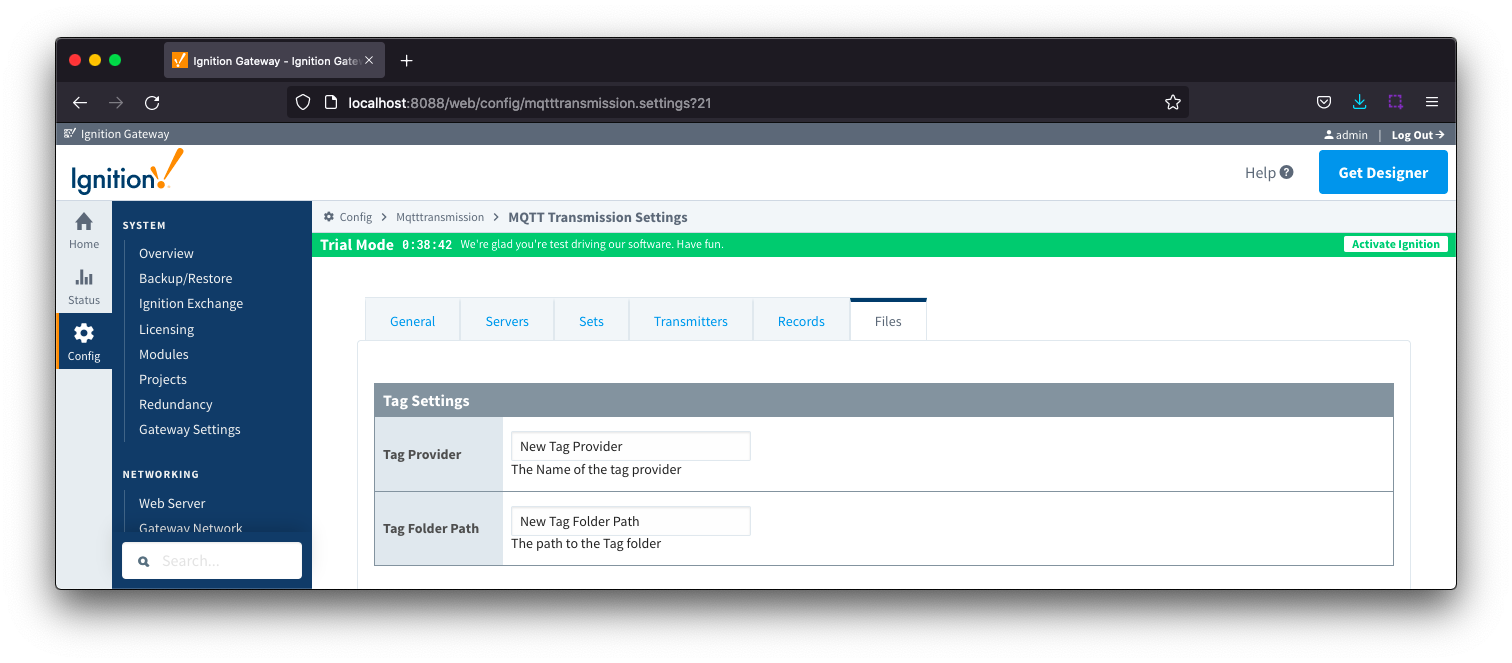 Image Added
Image Added
- Tag Provider
- The name of the tag provider (i.e. default)
- Tag Folder Path
- The path to the tag folder under specified tag provider
| Anchor |
|---|
| FilesFileSettings |
|---|
| FilesFileSettings |
|---|
|
Files - File Settings Image Added
Image Added
- Enable Auto-Publish
- Checkbox to enable/disable auto publish of files. Not selected by default.
- File Scan Rate
- The rate, in seconds, to scan the files directory specified in the 'Publish Files Path' tag for files to publish. Default is 60 seconds.
| Anchor |
|---|
| FilesSparkplugSettings |
|---|
| FilesSparkplugSettings |
|---|
|
Files - Sparkplug Settings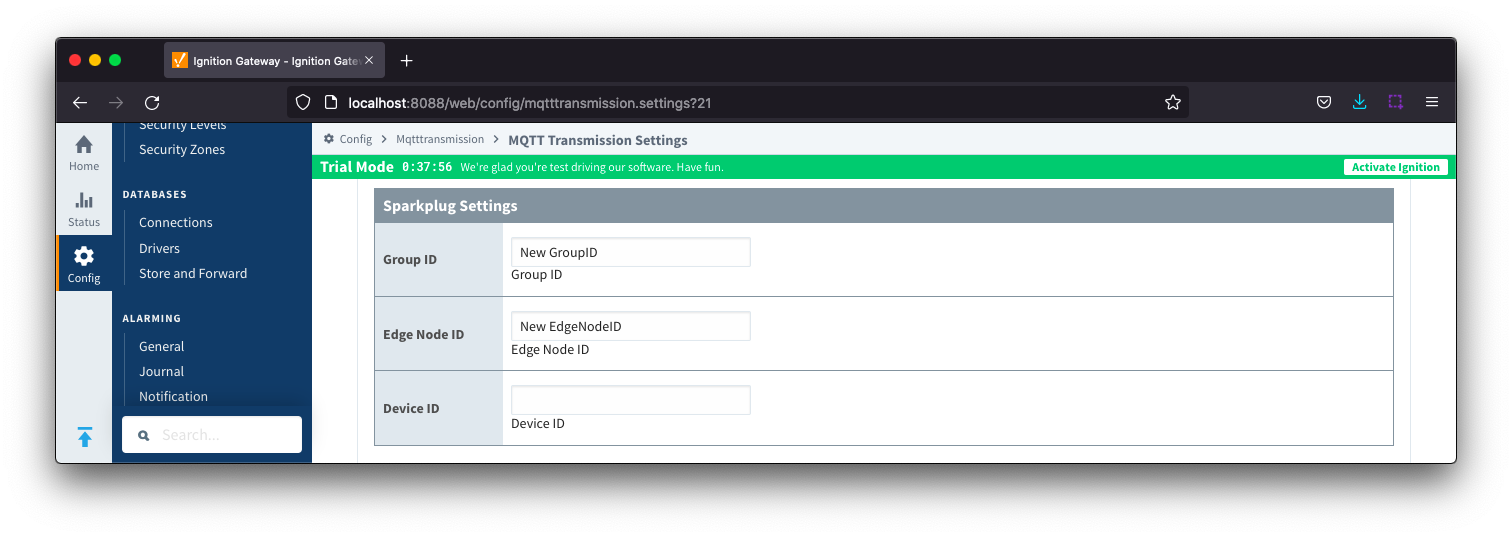 Image Added
Image Added
- Group ID
- An ID representing a logical grouping of MQTT Edge of Network (EoN) Nodes and Devices into the infrastructure.
- Edge Node ID
- An ID that uniquely identifies the MQTT Edge of Network (EoN) Node within the infrastructure.
- Device ID
- An Optional ID that uniquely identifies a Device within the infrastructure.
| Anchor |
|---|
| FilesAdvancedSettings |
|---|
| FilesAdvancedSettings |
|---|
|
Files - Advanced Settings
...
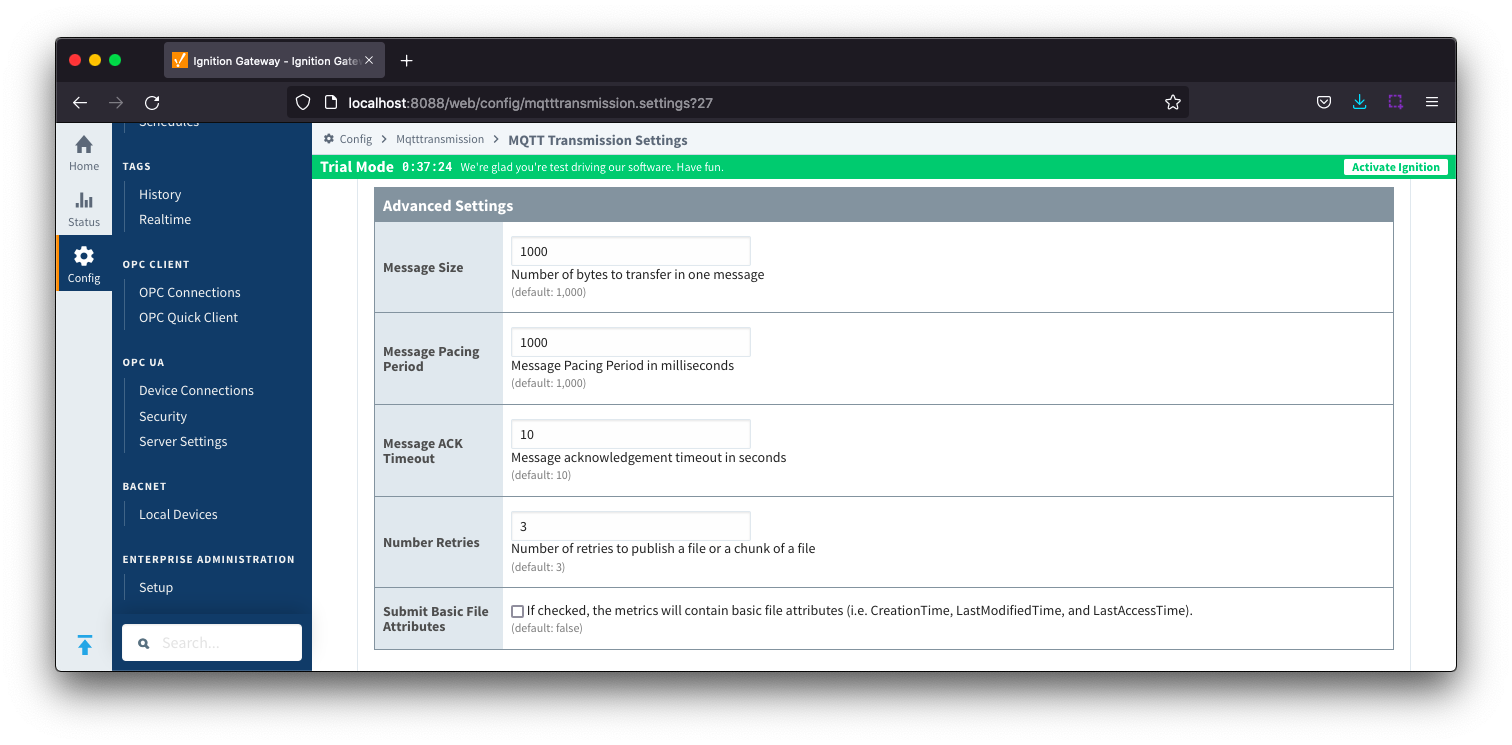 Image Added
Image Added
- Message Size
- Number of bytes to transfer in one message, Default 1000 bytes.
- Message Pacing Period
- Message Pacing Period is milliseconds. Default 1000 milliseconds.
- Message ACK Timeout
- Message acknowledgement timeout in seconds. Default 10 seconds.
- Number Retries
- Number of retries to publish a file or chunk or a file
- Submit Basic File Attributes
- Checkbox to enable/disable the basic file attributes to be included in the metrics. Not selected by default.
...
The "History" page allows for the configuration of MQTT Transmission History Stores. In the event that a Transmitter loses its connection with the MQTT Server and is unable to reconnect, a History Store (if enabled) will store all messages corresponding to change events on the monitored tags. Once a connection with an MQTT server is reestablished the History Store will publish the stored messages with a flag set to indicate that the messages are "historical" to prevent confusion with live data values.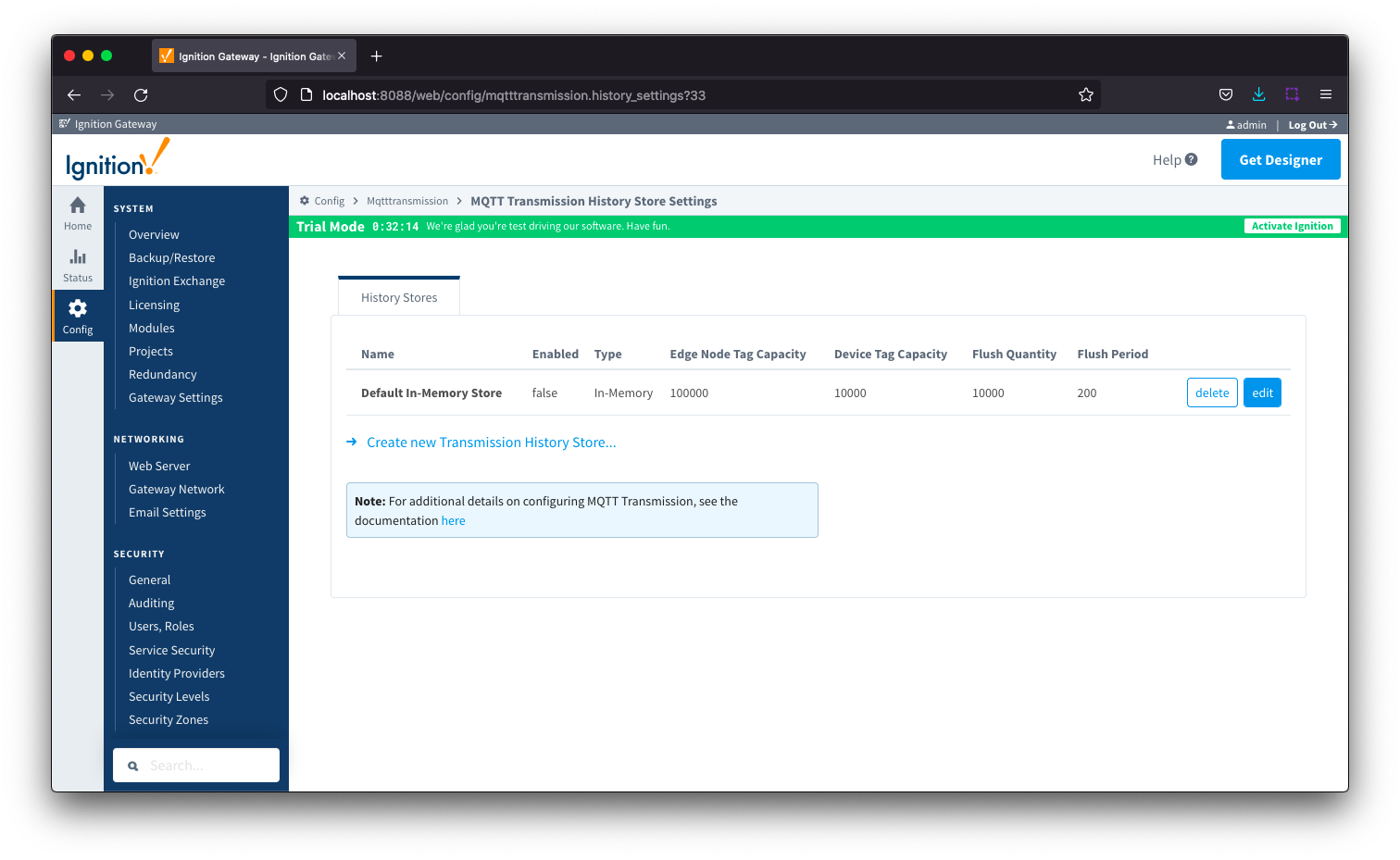 Image Added
Image Added
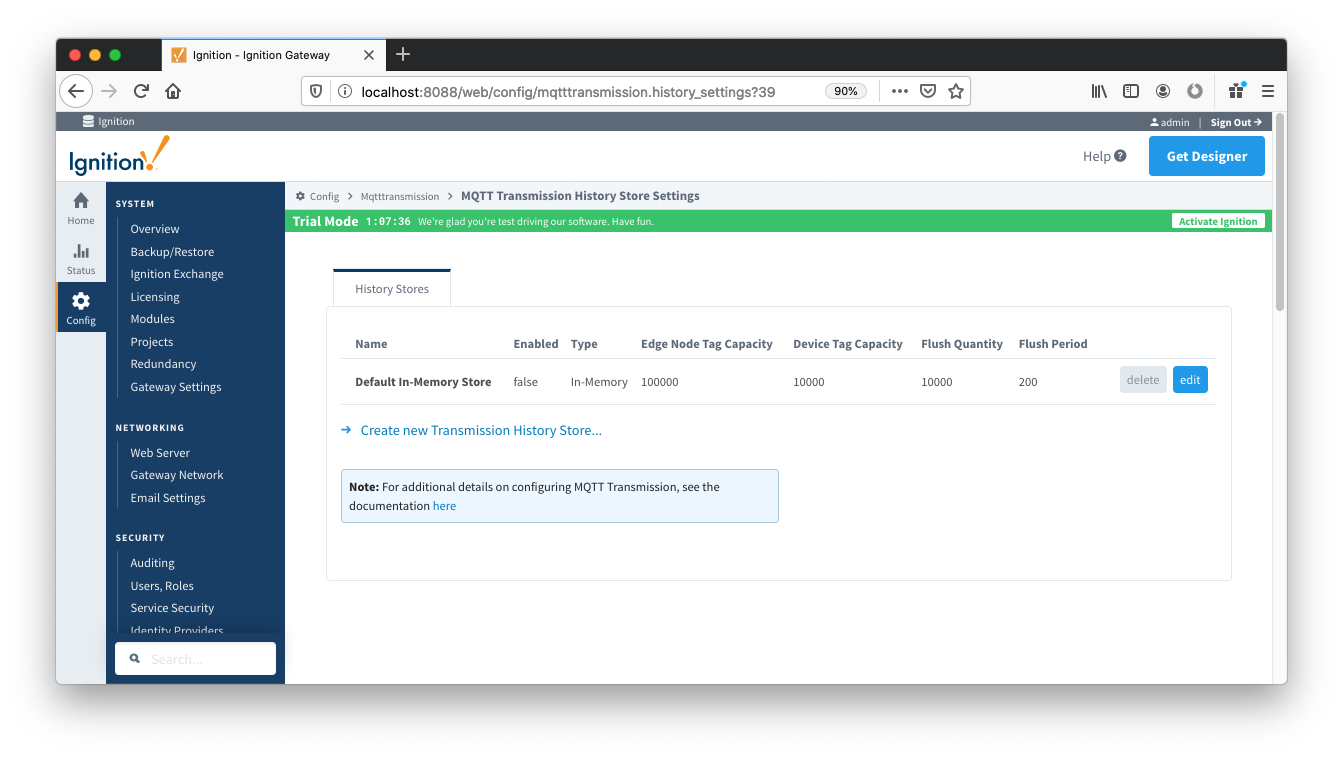 Image Removed
Image Removed
The History tab contains a single Main section.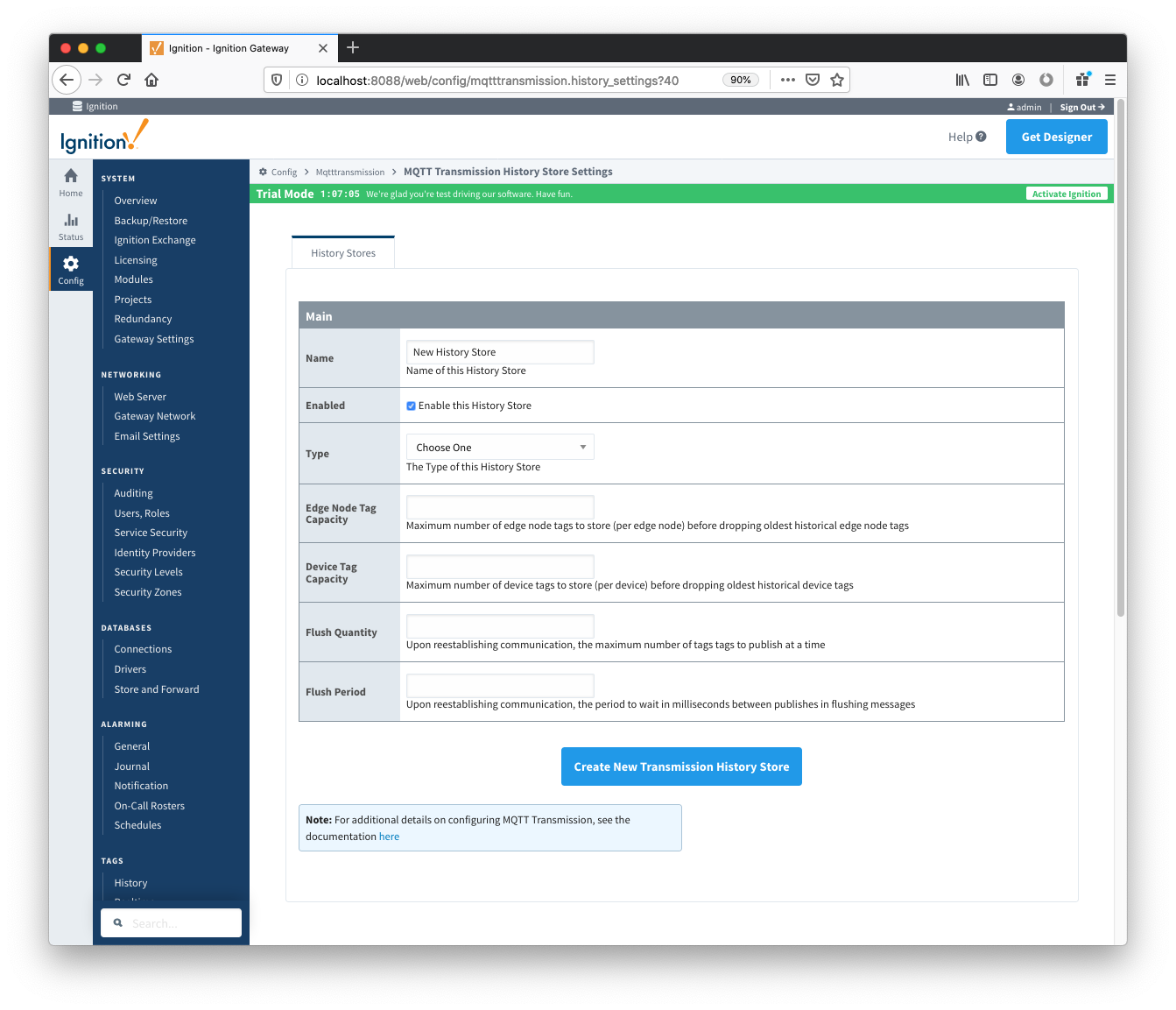 Image Removed
Image Removed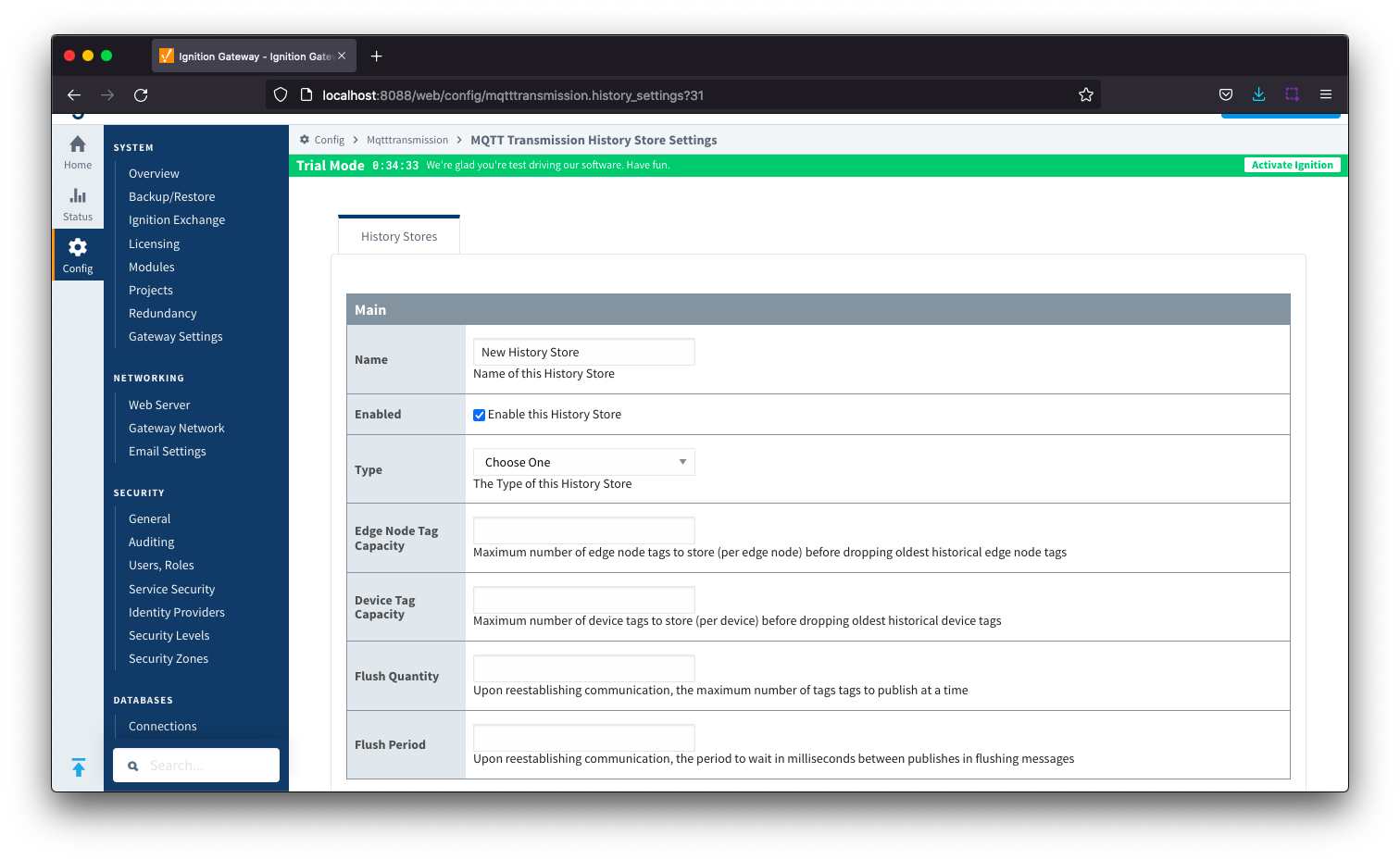 Image Added
Image Added
History - Main
...
![]()
![]()
![]()
![]()
![]()
![]()
![]()
![]()
![]()